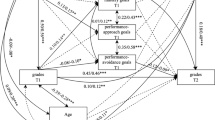Abstract
The Group Embedded Figures Test (GEFT) of field independence was administered to 203 Jamaican sixth form (pre-university) students pursuing advanced-level (A-level) courses with either an arts or a science emphasis. The science-emphasis group obtained significantly higher scores on the GEFT than the arts-emphasis group. In addition, field independence was found to be important for the A-level success of students, regardless of whether they pursued arts- or science-emphasis courses. The implication of this finding to education at advanced level is discussed.
Similar content being viewed by others
References
Bloom, B.S. (Ed.). (1956).Taxonomy of educational objectives. Book 1. Cognitive Domain. New York: Longman.
Entwistle, N.J. (1977). Strategies of learning and studying. Recent research findings.British Journal of Educational Studies, 25 (3), 225–238.
Entwistle, N.J., & Hounsell, D.J. (Eds) (1975)How students learn: Readings in higher education (1). Institute for Research and Development in Post-Compulsory Education, University of Lancaster.
Field, T.W., & Poole, M.E. (1970). Intellectual style and achievement of arts and science undergraduates.British Journal of Educational Psychology, 40, 338–341.
Hudson, L. (1963). The relation of psychological test scores to academic bias.British Journal of Educational Psychology, 33, 120–131.
Leo-Rhynie, E.A. (1978).An investigation into the relationship of certain cognitive, environmental, experiential and motivational variables to the academic achievement of selected Jamaican Sixth form students. Unpublished Ph.D. thesis, University of the West Indies.
Marton, F., & Saljo, R. (1976a). On qualitative differences in learning I: Outcome and process.British Journal of Educational Psychology, 46 (1), 7–8.
Marton, F., & Saljo, R. (1976b). On qualitative differences in learning II: Outcome as a function of the learner’s conception of the task.British Journal of Educational Psychology, 46 (2), 115–127.
Oltman, P.K., Raskin, E., & Witkin, H.A. (1971).Group embedded figures test. Consulting Psychologists Press, Inc., California.
Perry, W.G. (1970).Forms of intellectual and ethical development in the college years: A scheme. New York: Holt, Rinehart & Winston.
Roach, D.A. (1978).The effect of cognitive style and other related variables on the achievement in mathematics of some Jamaican elementary school children. Unpublished Ph.D. thesis, University of the West Indies.
Roberge, J.J., & Flexer, B.K. (1981). Reexamination of the covariation of field independence, intelligence and achievement.British Journal of Educational Psychology, 51, 235–236.
Satterly, D.J. (1976). Cognitive styles, spatial ability and school achievement.Journal of Educational Psychology, 68, (1), 36–42.
Satterly, D.J. (1979). Covariation of cognitive styles, intelligence and achievement.British Journal of Educational Psychology, 49, 179–181.
Vernon, P.E. (1969).Intelligence and cultural environment. London: Methuen.
Vernon, P.E. (1972). The distinctiveness of field independence.Journal of Personality, 40, 366–391.
Witkin, H.A. (1973).The role of cognitive style in academic performance and in teacher-student relations. Educational Testing Service, Research Bulletin (mimeo).
Witkin, H.A., Dyk, R.B., Faterson, H.F. Goodenough, D.R., & Karp, S.A. (1962).Psychological differentiation. New York: John Wiley.
Witkin, H.A., & Moore, C.A. (1974).Cognitive style and the teaching-learning process. Princeton, N.J.: Educational Testing Service.
Witkin, H.A., Moore, C.A., Oltman, P.K., Goodenough, D.R., Friedman, F., Owen, D.R., & Raskin, E. (1977). Role of the field dependent and field independent cognitive style in academic evolution: A longitudinal study.Journal of Educational Psychology, 69 (3), 197–211.
Witkin, H.A., Oltman, P.K., Raskin, E., & Karp, S.A. (1971).A manual for the embedded figures test. Consulting Psychologists Press, Inc., California.
Author information
Authors and Affiliations
Rights and permissions
About this article
Cite this article
Leo-Rhynie, E. Field independence, academic orientation, and achievement. Current Psychology 4, 22–27 (1985). https://doi.org/10.1007/BF02686563
Accepted:
Published:
Issue Date:
DOI: https://doi.org/10.1007/BF02686563




